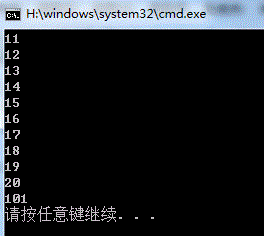static
#include<stdio.h> #include<iostream> #include<assert.h> using namespace std; static int a=100; void func() { static int a=10; a++; cout<<a<<endl; } int main() { for(int i=0; i<10; i++) func(); a++; cout<<a<<endl; }

#include<stdio.h> #include<iostream> #include<assert.h> using namespace std; static int a=100; void func() { a++; } int main() {
func(); a++; cout<<a<<endl; }

#include<iostream> using namespace std; class A { public: A(){ updateCount(); } static int showCount; void updateCount(){ showCount++;} static void printCount(){ cout<<showCount<<endl; } private: }; int A::showCount=0; int main() { A::printCount(); A a1; A a2; A::printCount(); }

联合:
联合(union)介绍
#include<stdio.h> #include<iostream> #include<assert.h> using namespace std; union test{ int a; char b; short c; }; int main() { test t; t.a=10; t.c=20; cout<<t.a<<endl; cout<<t.c<<endl; cout<<sizeof(test)<<endl; }

const
只读的
register
寄存器变量,要求编译器把一个变量的值保存在CPU寄存器而不是内存中,使对寄存器变量的操作比普通内存变量快。
注意:只能用register修饰局部变量和形式参数;在C中不能通过&运算符取寄存器变量地址,在C++取寄存器变量地址可能阻止它被优化。
extern
extern可以置于变量或者函数前,以标示变量或者函数的定义在别的文件中,提示编译器遇到此变量和函数时在其他模块中寻找其定义
mutable
在C++中,mutable是为了突破const的限制而设置的。被mutable修饰的变量,将永远处于可变的状态,即使在一个const函数中,甚至结构体变量或者类对象为const,其mutable成员也可以被修改。
struct ST { int a; mutable int b; }; const ST st={1,2}; st.a=11;//编译错误 st.b=22;//允许
volatile
volatile修饰的数据,"直接存取原始内存地址",编译器不可对其进行执行期寄存于寄存器的优化。这种特性,是为了满足多线程同步、中断、硬件编程等特殊需要。遇到这个关键字声明的变量,编译器对访问该变量的代码就不再进行优化,从而可以提供对特殊地址的直接访问。
一般说来,volatile用在如下的几个地方:
1、中断服务程序中修改的供其它程序检测的变量需要加volatile;
2、多任务环境下各任务间共享的标志应该加volatile;
3、存储器映射的硬件寄存器通常也要加volatile说明,因为每次对它的读写都可能有不同意义
一个由C/C++编译的程序占用的内存分为以下几个部分。
- 栈区(stack):由编译器自动分配释放 ,存放函数的参数值,局部变量的值等。其操作方式类似于数据结构中的栈。
- 堆区(heap):由程序员分配释放, 若程序员不释放,程序结束时可能由操作系统回收 。注意它与数据结构中的堆是两回事,分配方式倒是类似于链表。
- 全局/静态区(static): 全局变量和静态变量的存储是放在一块的,初始化的全局变量和静态变量在一块区域,未初始化的全局变量和未初始化的静态变量在相邻的另一块区域。程序结束后由系统释放。
- 文字常量区:常量字符串就是放在这里的,程序结束后由系统释放。
- 程序代码区:存放函数体的二进制代码。
int a = 0;// 全局初始化区
char *p1;//全局未初始化区
void main()
{
int b; //栈
char s[] = "abc"; //栈,运行时赋值
char *p2;// 栈
char *p3 = "123456";// 123456�在常量区,p3在栈上。编译时确定。
static int c =0;// 全局(静态)初始化区
p1 = (char *)malloc(10); //p1指向堆区,p1在栈上
}
指针辨认;
int * p;//指向int型的指针 void * p;//空类型指针 int * arr[10];//指针数组x存放10个指向int型的指针 int** pp;//指针的指针(指向int型的指针的指针) int (*func_p)(int,int);//函数指针
注:在C中可以直接将void*指针赋值给其他任意类型指针,而在C++中需使用强制类型转换。
利用指针传递内存
void getMemory1(char *p) { p=(char *)malloc(100); //p为局部变量 } char * getMemory2() { char ch[]="hello world"; //在栈上分配内存,函数结束回收内存,ch将成为野指针 return ch; } void getMemory3(char **p) { *p=(char*)malloc(100); //正确 } char * getMemory4() { char *p; p=(char*)malloc(100); //正确 return p; }
extern可以置于变量或者函数前,以标示变量或者函数的定义在别的文件中,提示编译器遇到此变量和函数时在其他模块中寻找其定义